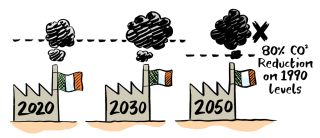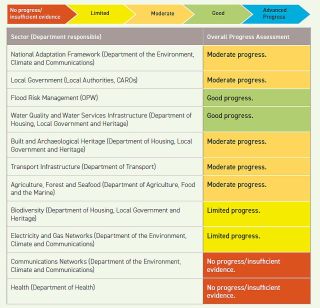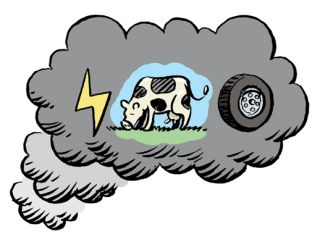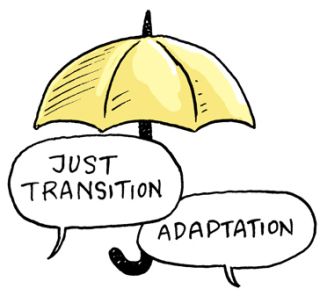Time to bridge the gap between climate policy and climate action

The Climate Change Advisory Council’s Annual Review 2021 is a challenging read. The review considers progress of our national climate aims in 2020 through climate change mitigation and adaptation, and compliance with national, European Union (EU) and international obligations related to climate action.Despite positive steps it identifies a significant gap between climate action policy and climate action delivery.
For example:
- Ireland has failed to meet its 2020 target of a 20% reduction in greenhouse gas emissions under the EU Effort Sharing Decision and will have to purchase emissions allowances from other Member States to meet the shortfall. National emissions projections published in June 2021 also suggest a significant exceedance of targets under the EU Effort Sharing Regulation to 2030 without the full use of the flexibilities anticipated in the Regulation.
- Many of the measures in the 2019 Climate Action Plan were delayed, with the transport and heat sectors of particular concern. Timely delivery of measures is essential if we are to meet our targets.
- The national Climate Action Delivery Board, whose role is to hold each department and public body accountable for the delivery of actions set out in the Climate Action Plan, did not meet in 2020 despite a commitment to meet quarterly.
- A significant gap remains between the ambition of the National Adaptation Framework to deliver climate resilience, and its implementation. Despite some progress at sectoral and local level, adaptation is still not adequately considered or represented in a range of policies and initiatives.
- The Annual Transition Statement for 2020 has not yet been published.
- Progress of the National Coastal Change Management Strategy expected in Q1 2021 is overdue.
- Ireland has not yet submitted a mandatory Long-Term Strategy to the EU due by the 1 January 2020 under the 2018 Energy Governance Regulation, nor a voluntary submission to the UNFCCC.
Adaptation Scorecard 2021

The review also includes for the first time an adaptation scorecard, which considers progress across Government Departments on the 12 National Adaptation Framework (NAF) sectors, local government and the NAF itself. The review finds that ‘Flood Risk Management’ and ‘Water Quality and Water Services Infrastructure’ sectors have implemented the most substantial adaptation plans, but found little progress in the ‘Health’ and ‘Communications Networks’ sectors.

When considering national policy goals to 2050, the review finds that Ireland is significantly off-track from paths that deliver long-term transition to climate neutrality.
Agriculture is the largest sectoral contributor to greenhouse gas emissions in Ireland. It is not on a sustainable low-carbon path. Expansion in production in some farming sectors has negated the impact of efficiency gains and reduced activity in other farming sectors leading to increased emissions. Significant action will be required to deliver a transition that supports low emissions agriculture and land use, reversal of water quality degradation and biodiversity loss, and achieve sustainable rural development.
Land Use Land Use Change and Forestry is an important sector in relation to greenhouse gas emissions and removals in Ireland. Land management has the potential to remove significant CO2 from the atmosphere, and thereby contribute to achieving climate neutrality. However, land use in Ireland has been a significant net source of emissions in all years since 1990. Current projections expect land use to become an even larger net source of emissions in the coming years.
Transport trends are not consistent with a sustainable low-carbon path, making emissions reductions more difficult, while also driving congestion and a host of sustainability problems and costs. It is necessary to accelerate electrification while putting an urgent priority on long-term integrated spatial and mobility planning supporting public transport and active travel in Ireland.
Early progress in the Built Environment has stalled. Emissions reduction requires action on retrofit to improve homes, increased electrification of heat and deployment of renewables. Progress in industry and manufacturing has also slowed.
Electricity Generation has been a good news story so far, as Ireland’s best performing sector when it comes to reducing emissions. However, Ireland needs to focus on delivering carbon neutral power generation as soon as possible, and this will require increased connection of renewables and storage to ensure security of supply.

Cost implications for failing to act now
There are higher cost implications of any delays in long-term action, requiring deeper and more costly cuts in emissions later. This includes any costs of compliance with 2020 and 2030 targets, given the impending deepening of 2030 emissions targets, under the European Climate Law and the related ‘Fit for 55’ package of legislative measures. The Council considers it prudent for the Department of Public Expenditure and Reform to update their estimates of the range of potential costs to 2030.
In the longer term, relying on purchasing credits can deepen carbon lock-in, forgoes the benefits of transition and imposes a cost on the exchequer, and thereby ultimately on all citizens. This is a cost that could be avoided by actual emissions reductions.
The carbon budgets proposed by the Council3 balance the urgency for era defining change and practical feasibility whilst also providing for a 51% reduction in the total amount of greenhouse gas emissions from 2018 by 2030 in line with the ambition of the Climate Amendment Act. This transition will require rapid and sustained economic, social and technological transformation across all sectors of the economy and increased investment must start now. The time-lag between policy development, implementation and actual emissions reduction confirms this urgency. Unless Government takes action now, we will be unable to meet our targets in future years.
Meanwhile, the potential cost of climate change adaptation remains substantially unquantified at national scale, with it being left to individual sectors to address such issues. This approach is a barrier to effective decision making and opens the door to fragmentation and a conflict for resources.
The impacts of climate change are already felt across the globe and the prevention of further climate change in itself is the most important benefit of climate action and Ireland has committed to playing its part in this global effort. In addition to the direct benefits of climate action it can bring about more immediate indirect benefits including benefits for human health, air and water quality, biodiversity and energy cost savings, along with opportunities for innovation which would enhance competitiveness within global markets which demand sustainability.

Just transition
The review acknowledges that the transition will have a cost and preparations will be required to reduce the impact on the most vulnerable. Just transition is relevant to livelihoods, where carbon intensive economic activities become subject to increased pressure for transition. It also encompasses the need to ensure that poorer households do not bear the burden of policies to reduce emissions and also that the benefits of transition and Government supports are shared equitably. Just transition efforts will need to be proactive in identifying vulnerable communities and solutions.
Policy recommendations
One of the fundamental principles of a Just Transition is to leave no people, communities, economic sectors or regions behind as we transition to a low carbon future. Transition is not just about reducing emissions. This is just one part. It is also about transforming our society and our economy, and investing in effective and integrated social protection systems, education, training and lifelong learning, childcare, out of school care, health care, long term care and other quality services, Social investment must be a top priority of transition because it is this social investment that will support those people, communities, sectors and regions as we make the difficult transition to a carbon-neutral economy, transforming how our economy and society operates.
The coming decade will be one of transformation as we try to meet our climate goals. There are some specific policies that Social Justice Ireland has consistently advocated for, that would support us in meeting these targets in the years ahead. These are:
- Set ambitious emissions reduction targets for 2030 and ensure sufficient resources to support implementation of these targets;
- Adopt targets and a reporting system for each of the Sustainable Development Goals;
- Integrate a Sustainable Development Framework into economic policy;
- Introduce a strategy for Ireland that includes the principles of the circular economy and cradle-to-cradle development;
- Introduce shadow national accounts, and assign value to natural capital and ecosystems in our national accounting systems;
- Develop a comprehensive mitigation and transition programme to support communities and people in the transition to a low carbon society;
- Develop a progressive and equitable environmental taxation system;
- Develop a new National Index of Progress encompassing environmental and social indicators of progress as well as economic ones;
- Develop a Just Transition Dialogue structure at regional and national level.